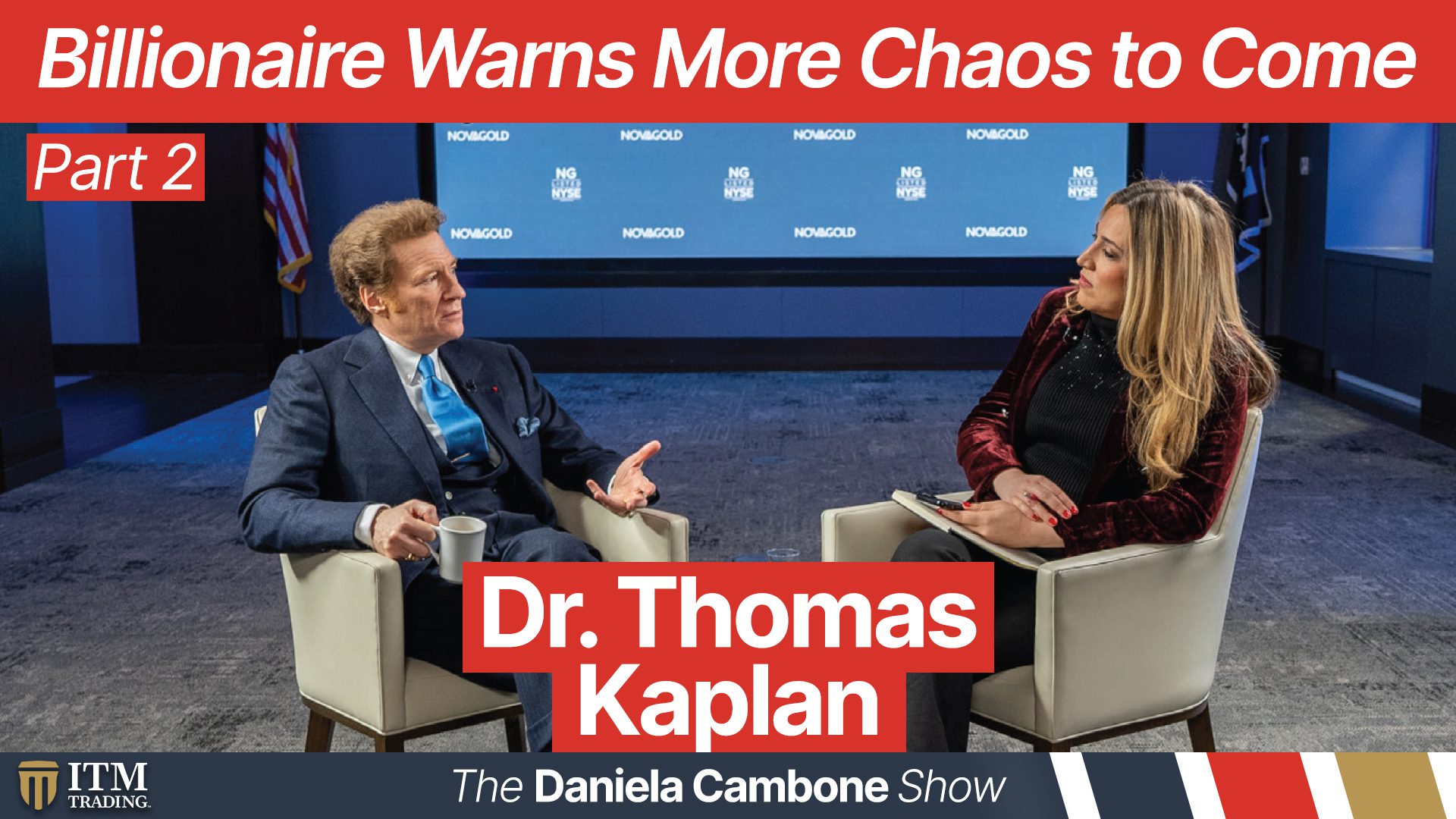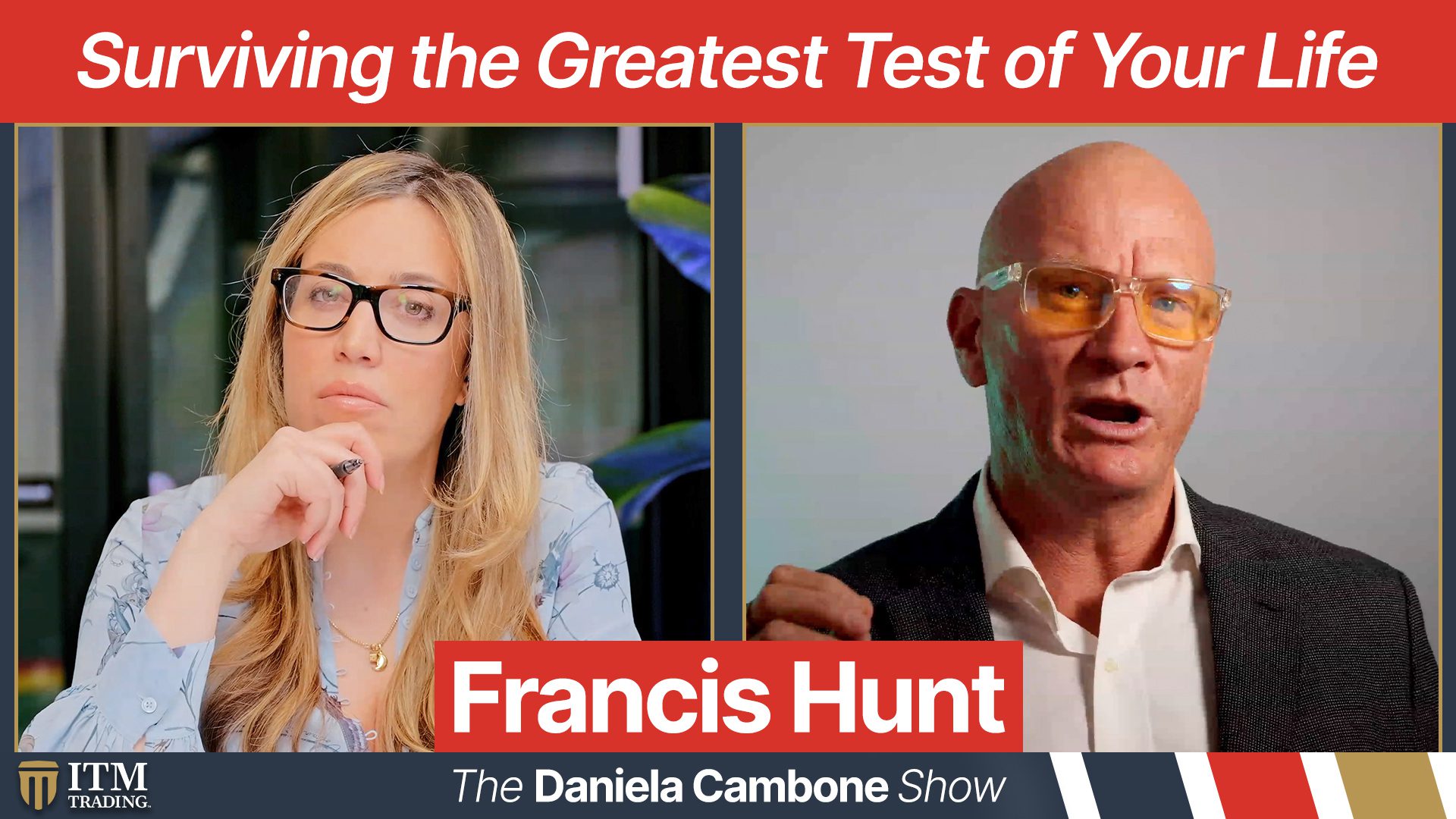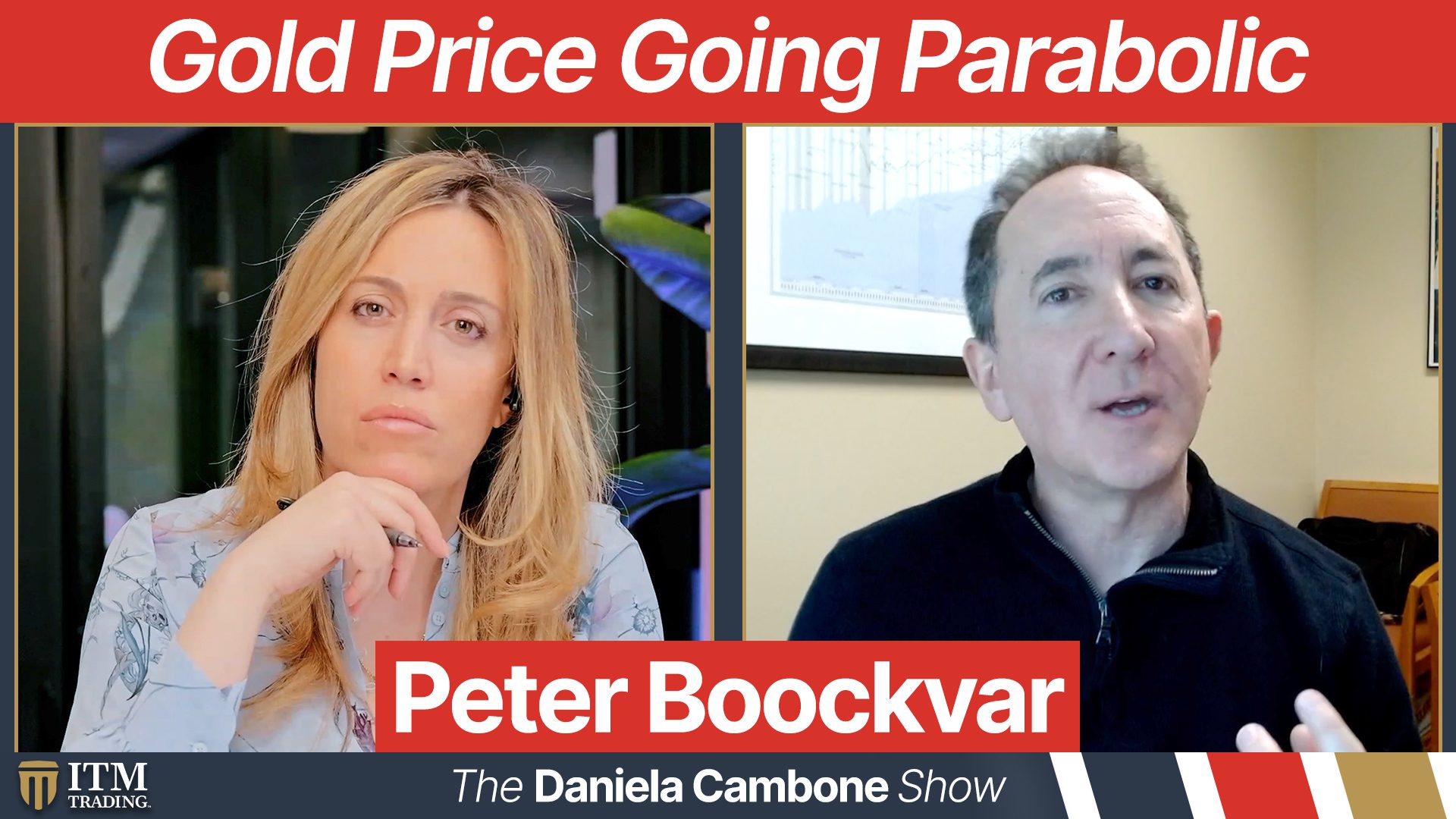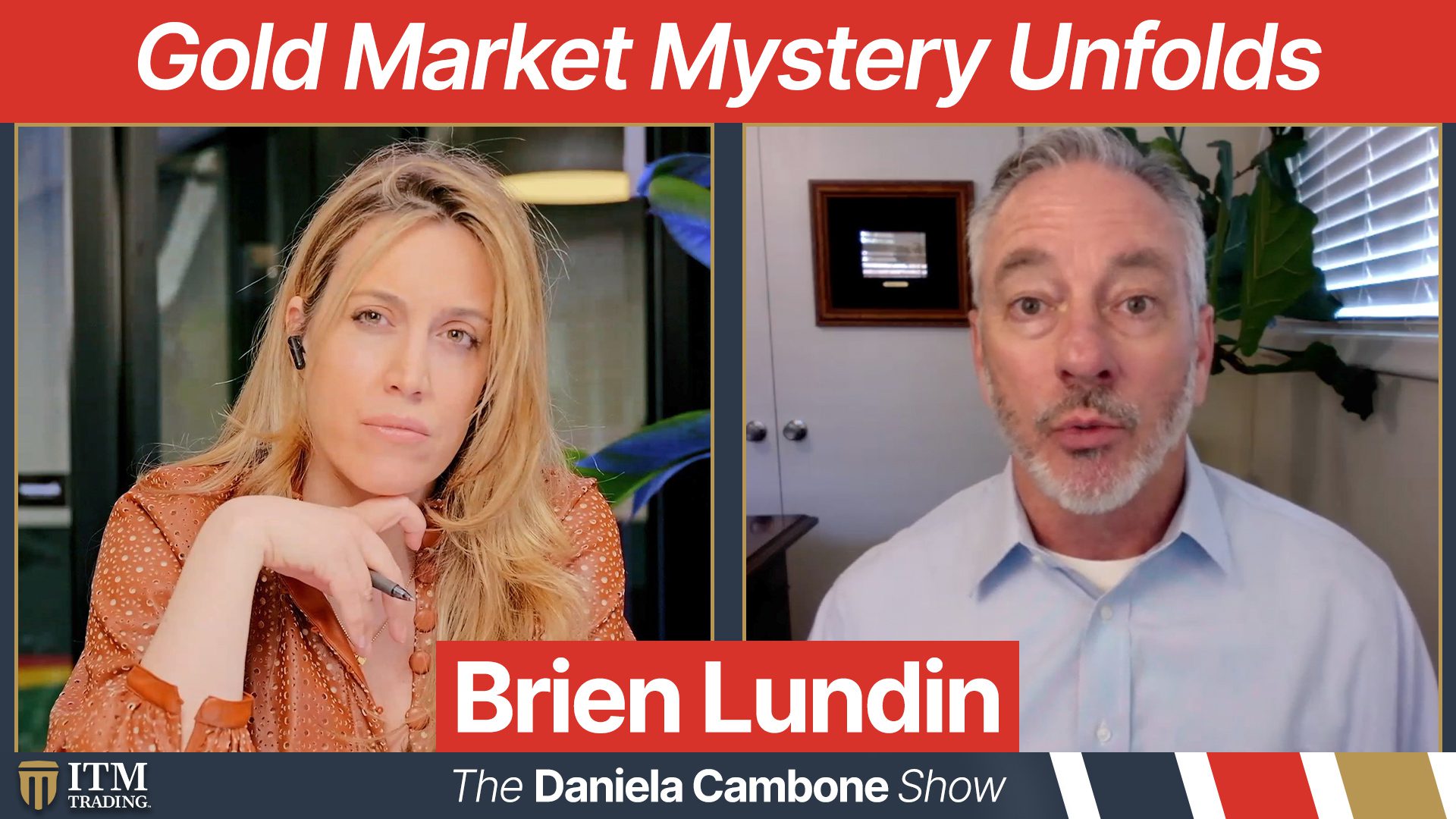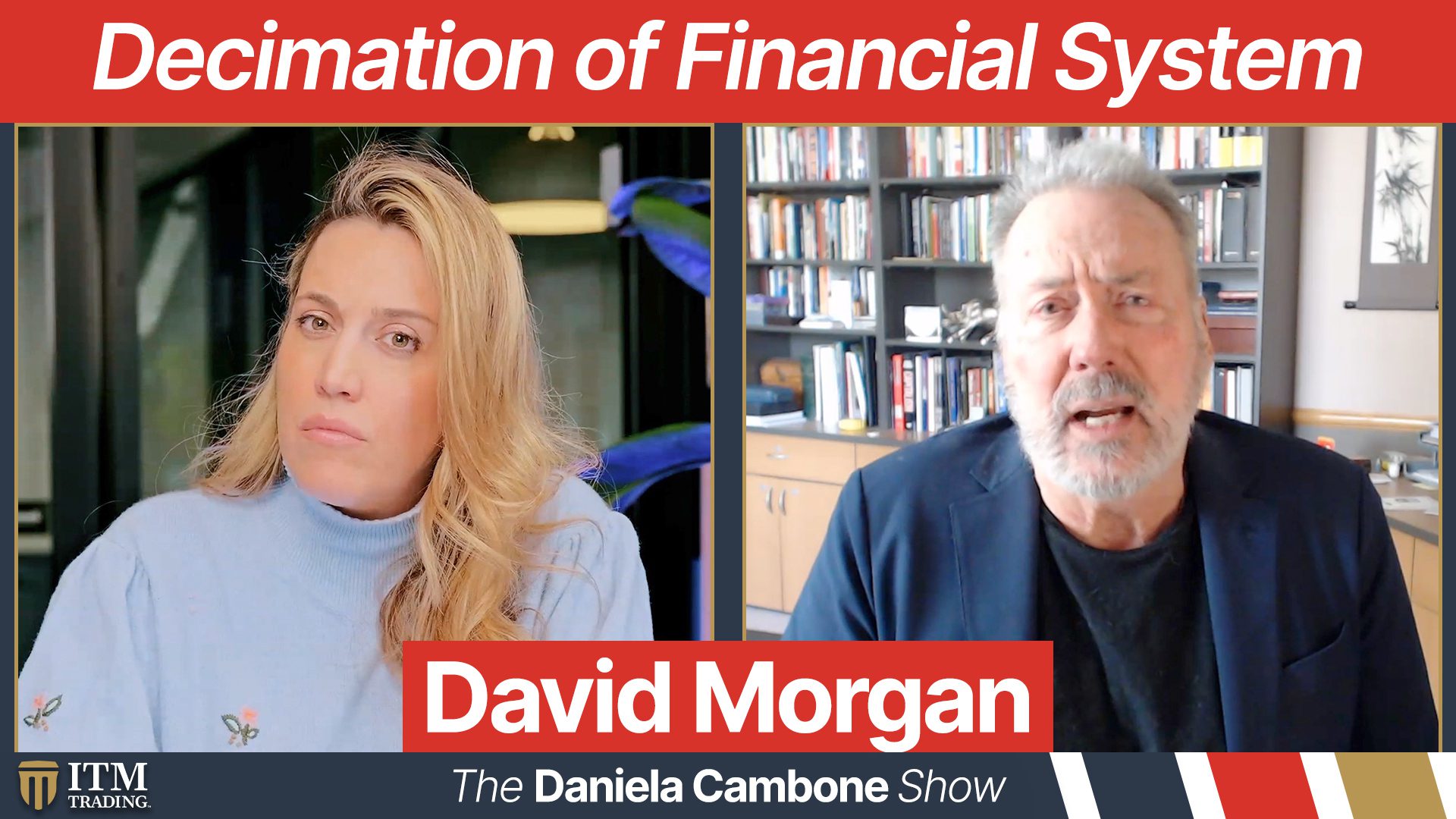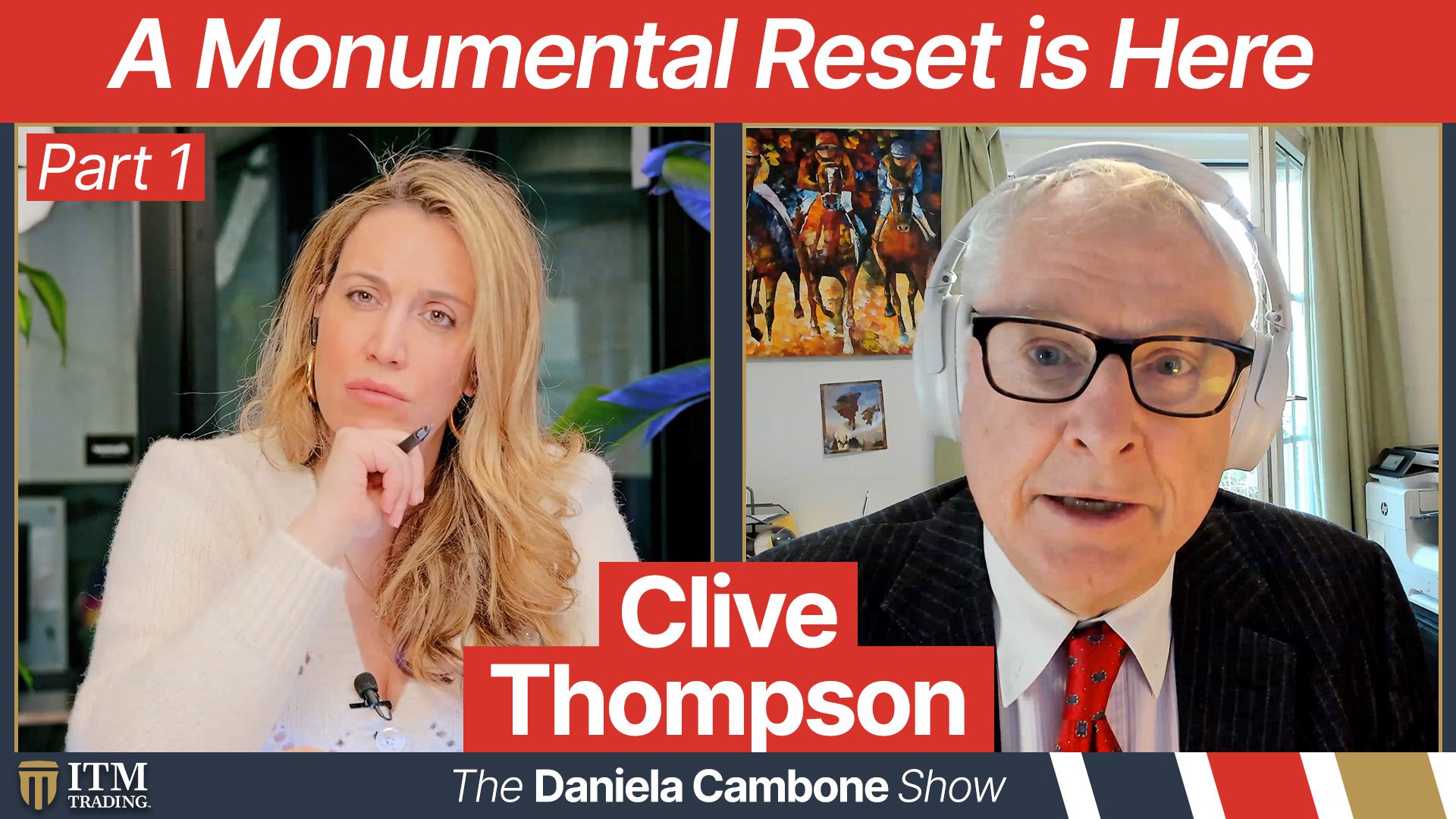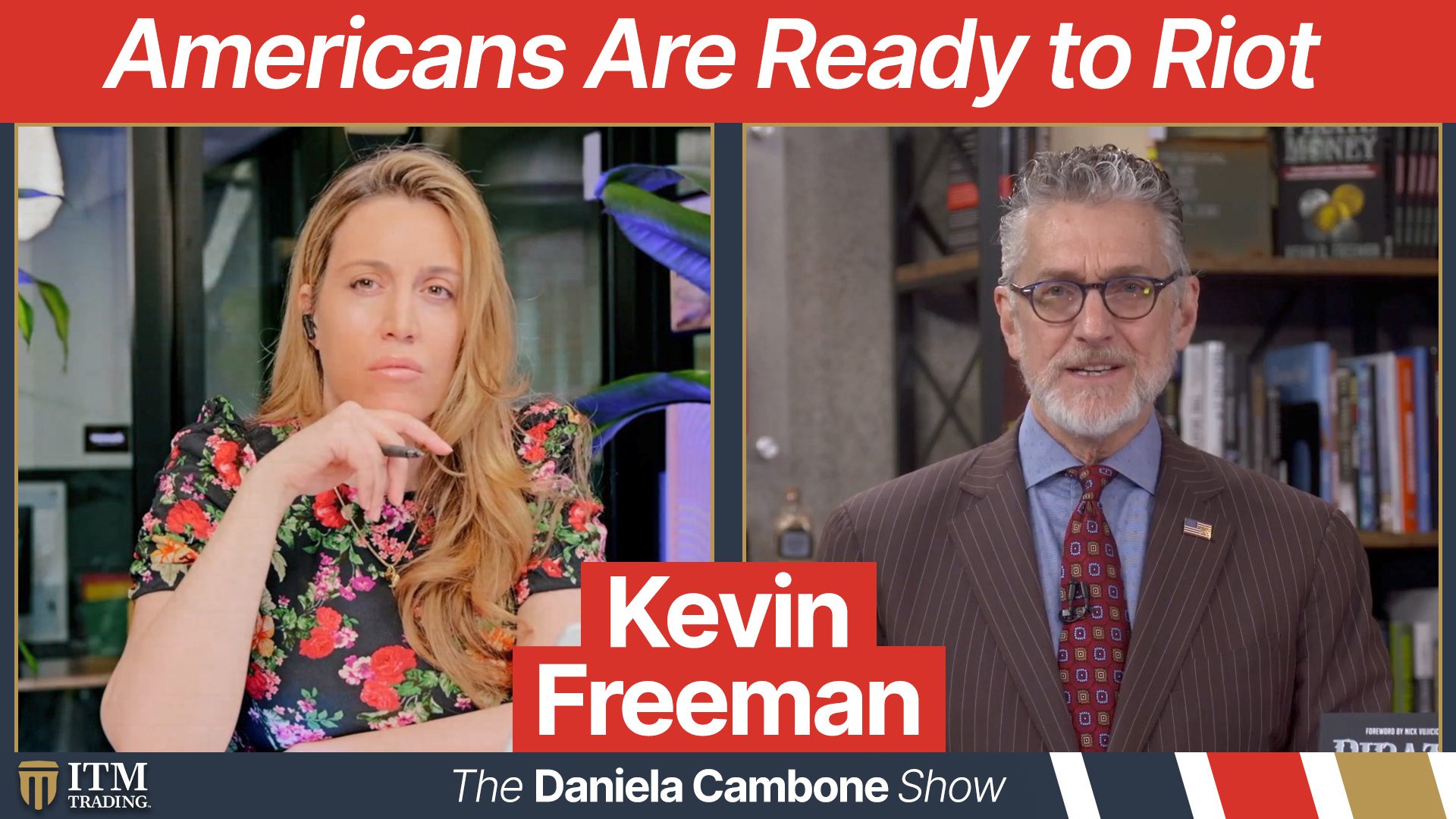Reset To Happen Drastically Without Warning; I Fear “Dystopian Future” For Grandkids Warns Insider
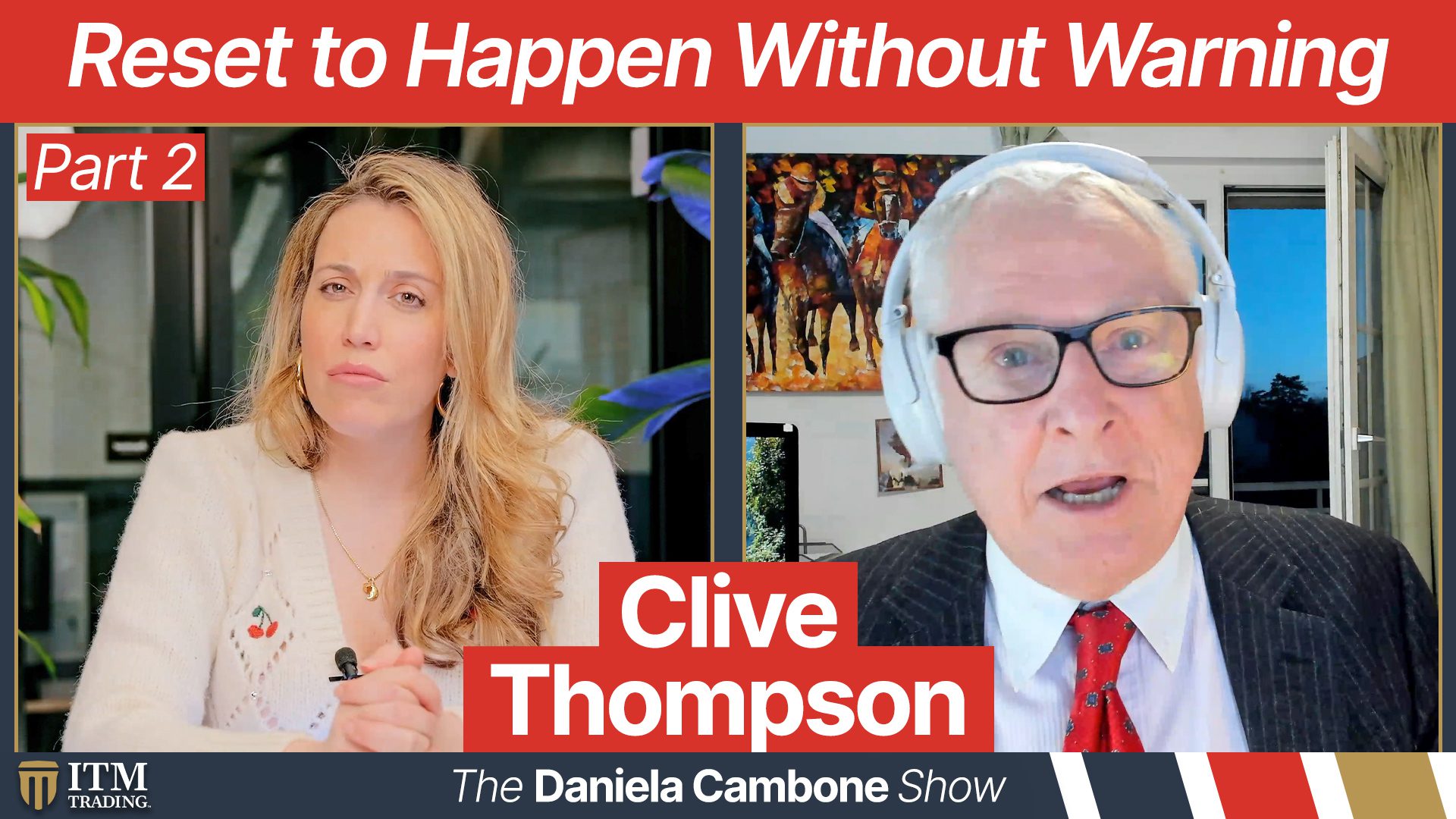
“If we get to a currency reset, the countries that have a lot of gold will be sitting at the table. And those who have no gold will be told what to do,” warns Clive Thompson, retired managing director for Union Bancaire Privée in Switzerland. Building on his earlier insights regarding the expanding fiat wealth, Thompson delves into the unsettling prospects arising from the questioning of the dollar’s supremacy and the importance of de-dollarization in the second part of the interview with Daniela Cambone. He highlights some precarious scenarios when central bank digital currencies are ushered in and how it could erode personal freedoms and privacy not just for ourselves but for future generations. “It’ll become more and more difficult to spend your money without using the CBDC,” he warns.
CHAPTERS:
00:00 De-dollarization
4:20 Can the U.S. stop de-dollarization?
5:13 BRICS currency and U.S. dollar
5:50 Currency reset
8:39 Debt issue
9:35 Alternative scenario as debt spirals out of control
11:10 CBDC
16:33 Reset
20:20 Can we stop the reset?
27:50 CBDC scenarios
31:59 Concluding words
TRANSCRIPT FROM VIDEO:
00:00
A central bank digital currency, over time, is likely to become the only currency you’re able to use for any kind of transaction. That’s absolutely terrifying. Do people have the power to stand up and say, no, we don’t want this reset? Obviously, if you’ve got gold, everyone’s going to take the gold no matter where you are on the planet. And those who have no gold will be told what to do. I could absolutely see this happening.
00:28
All right, we are back with Clive.
00:31
Thompson, he’s a retired managing director for Union Bancaire Privée in Switzerland. He joins me from Geneva. If you missed part one, I urge you to watch it because we cover the crisis in the banking sector. Is there one? Isn’t there one? Clive gives his thoughts, whether you should have money in the banks. We talked gold, we talked Bitcoin, we talked the Fed. But now it is part two, and we’re going to talk about de-dollarization and central bank digital currencies. Clive, welcome back for part two.
01:00
Well, thank you very much, Daniela, and thank you for having me on your show. Yes, fantastic conversation thus far. So many questions about de-dollarization, and there’s so many conversations about how it will happen. Is it a BRICS currency? Is it a petrol dollar backed by gold? But I know one source I speak to often, Frank Giustra, tells me what is happening is that the world is turning to
01:29
bilateral trade agreements using local currencies and it takes away the use of the US dollar. So I want to just get your thoughts on that or how you see de-dollarization being shaped here.
01:46
America has weaponized the dollar. And that is making a lot of countries around the world nervous. Not because they’re enemies of the United States. Of course, there are plenty of enemies of the United States, but rather because they’re not an ally of the United States and they don’t know if they could be next on the list if something goes wrong in some way. So as an example, we have India quite happily trading with Russia and China. And
02:15
there’s no consequences for India as of today. But what if America decides to weaponize the dollar against India and make it difficult for India to do transfers through dollars around the world? So countries around the world are starting to look at alternatives, a plan B. So if things go awry, they have another way of transacting. And as you said, trading in local currencies is one of the ways you could be checked by the Brazilians could be using.
02:45
Brazilian Real to buy Chinese goods and the Chinese are using the Chinese Yuan to buy Brazilian goods, that’s certainly a way. But that’s not really a uniform currency. We’re not getting yet to the point of a BRICS currency. So there’s no immediate known plan to have a BRICS currency but I think it’s going to come down the line. I think that’s the next step. It might be the Asian Development Bank or maybe there’ll be a new.
03:11
central bank for a BRICS currency. And the way I see that potentially working is they might require the central banks of the trading partners, the ones in the BRICS agreement, to deposit a certain amount of gold with the central bank for the BRICS country. So each country will have their gold in the central bank. And then they can trade freely between each other. But if there’s a trade imbalance and one country has a surplus or a deficit,
03:38
the difference can be settled up in gold. And I think that’s kind of the way it used to happen in the old days before we went off the gold standard, then it became the dollar standard, it happened like that in the dollar standard. But now that’s not working anymore because, some countries fear it won’t work because of the dollarization and there’s a fear that your dollar reserves will be frozen or there’s a fear that you won’t be allowed to use the US banking system to pay dollars from country A to country B. So countries are starting to look at ways to
04:07
protect themselves against the dollar being used as a weapon. That basically is leading to a de-dollarization.
04:17
I mean, I would think, and I bring this up, that the United States obviously is aware they’ve weaponized, the government is aware they’ve weaponized the dollar. They don’t want de-dollarization to happen. Won’t they have playing cards to play to stop the process? Yeah, probably, but it doesn’t mean to say that the BRICS countries aren’t going to continue down the path of having a Plan B. So I think that Plan B continues.
04:46
And I also agree with you. I think the United States will start to make the right noises to say, don’t worry, we’ll give you your dollars back in due course, or we’re not gonna block you. But it’s a fact today that if you are a Russian importer, you can’t use dollars to buy anything. So in your view, you see it emerging as a BRICS, the BRICS currency out taking the US dollar.
05:14
Is that correct? No, I don’t, I mean, I see it as a, not a complete going against the dollar. I see it as a secondary currency. The dollar will still remain dominant for a very long time. The dollar, you know, the dollar is the king daddy of currencies. It’s gonna be like turning around a super super tanker. You can’t change that very quickly, but it will over time fall in importance in favor of some other currency, I think.
05:44
Is that, I know we spoke about central bank gold buying in part one, but is that part of the reason you think that Russia, China have been adding to their reserves for this very plan? The central banks around the world know that there’s two things they may have to do. They may have to trade in a way where they can’t use dollars because it might be blocked for some reason. They may have.
06:11
gone to war with somebody with which America doesn’t agree and they can’t use the US banking system. So they may have to pay with something else. And obviously if you’ve got gold, everyone’s gonna take the gold no matter where you are on the planet. And the second one is the risk of a failure of the Western currencies themselves, including the dollar. And that would be what we call a currency reset in an emergency or crisis situation, a chaotic situation. So if we get to a currency reset.
06:41
The country which has the most gold will call the shots and those who have a lot of gold will be sitting at the table. And those who have no gold will be told what to do.
06:54
So it is in every central bank’s interest to make sure they have enough gold. And you know, I can tell you, they’re not stupid. They know what’s gonna happen. They know that it’s just a question of time because if we take the US debt situation, the present path is unsustainable. Now this is not me saying it. This is the Federal Reserve, this is the Treasury. Everybody knows it’s unstable.
07:23
And they’re saying the government’s gonna do something about it, but the government hasn’t got the will at the moment. It’s an impasse. It can’t cut spending. That would be illegal because they’d be cutting into social security or pensions or something like that. So they can’t do that. Defense spending is a non-negotiable. So two thirds of the budget is what they call non-discretionary. So they can’t do anything about that. That’s the social security, pensions, all that. Then you’ve got one sixth, which is the defense. Well, they’re not gonna cut that.
07:53
the remaining one sixth, which is discretionary spending, even if they cut it to zero, under the present budget, they will still be running immense deficits, which means that they will still have to borrow more and more money. And the level of government debt is, in the United States is going up far too fast to be sustainable. The real problem we’ve got is the interest on that debt, which is going up.
08:23
and it’s pretty soon in a few years, probably before the end of 10 years, the interest will probably exceed the totality of the tax take in the United States at present. If they wanted to wipe out the debt and pay the debt, you’re saying they cannot? No, there’s no way to pay off the debt ever. It’s never gonna happen. The best we can hope for is that they balance their budget.
08:52
and with a balanced budget, the debt doesn’t grow anymore. But that seems like a far cry away. There’s no proposal to do that. They have a budget. Not enough tax dollars, not enough tax dollars to pay off the debt. So if you want to see where it’s going, you can go to the Congressional Budget Office’s website where they have all the figures about what they expect to happen. But they also, what they expect to happen is pretty bad, but they also have something called the alternative scenario. Now the alternative scenario is
09:21
between you and I is what I think they think really will happen. And that’s pretty disastrous in terms of the debt spiraling out of control. And so what is the alternative scenario? So the debt spirals out of control, then what? So we get to a point where people are unwilling to lend extra money to the United States government unless they have much higher interest rates. So.
09:49
let’s say, let’s take my pension plan, it’s probably got 60% in bonds and 40% in equities or something like that. Now the government’s issuing some more bonds and it asks my pension plan to buy it. Well, the only way they’re gonna buy it is if the interest rate on the next bond is higher than the last bond. And then they issue another one, and another one, another one. And after a while, the buyers of US Treasury debt, and they are, by the way, very abundant,
10:19
a hugely liquid market, so there’s plenty of buyers around, but their appetite to take extra debt at the old interest rate starts to reduce. So we start to see at the long end, the interest rate starting to spiral out of control. So that’s when things can go horribly wrong. Now I don’t think they should, because what should happen at that point is the Federal Reserve should step in.
10:47
and start buying that government debt to bail out the government by printing money. But of course, that brings a new problem, which is one of inflating the money supply massively, which means that everything on the planet is gonna cost more, including gold, of course. Which we’ve already, exactly, including gold, and which we’ve already seen, which leads me to really the next part and final part here as we wrap, Clive.
11:16
on central bank digital currencies, how does that fit into your narrative of the coming reset of a currency reset?
11:29
I, like a lot of people, are in two minds about the positives and the negatives of a central bank digital currency. If I get the opportunity to vote on it, I will vote against it. But the reason for that is not for my own personal benefit or for my own protection. I’m thinking about my children and my grandchildren because I fear that the introduction of a central bank digital currency will be
11:58
will bring in a dystopian future. Because a central bank digital currency, which is like, if it does come in, over time it’s likely to become the only currency you’re able to use or allowed to use for any kind of transaction. To start with, you’ll be able to use your old currency, your bank currency, whatever you like, and bank’s notes just like you do today. But over time I feel it’s gonna become a situation where you’re literally forced into using that and nothing else. And the central bank digital currencies are
12:28
technically programmable, which means they can determine what you spend it on, where you spend it, how much you spend. So if, for example, I’ll just give you a few examples. Let’s say, and you’re gonna agree with these first few things, you say that’s a jolly good thing when I start, but maybe when I get further down the line, you’re gonna say, well, that’s a bit unfair. Now let’s say I was
12:57
and I’m not a Colombian drug dealer. It’s perfectly reasonable and acceptable to everybody on the planet that you should decide as he’s now dealing in, he’s got no other choice but to deal in central bank digital currency. He’s perfectly reasonable that you’re gonna say, well, we’re gonna block his wallet. Let’s say I’m an escaped prisoner. I’m a mass murderer or something like that. And I’m on the run. You’re gonna want to block my wallet.
13:26
to make sure that I’m brought back to heel quickly. But now let’s go to some more mundane uses of it. Let’s say that I’m on social security, but I like to spend my money, which I get from social security, on gambling and booze and maybe drugs, all the bad things in life. Well, you might say, some people would certainly say, we should stop the person for buying those things and she’s only allowed to buy food.
13:55
or rent or drinks. Some people would say that’s unfair. So we’re starting to get a bit more borderline. Let’s go one step further and say, everybody has a carbon credit of how much we’re allowed to use up the carbon on the planet. How much we can drive a car, how much we can fly a plane, how much meat we can eat, because of course, don’t forget meat is beef and that’s apparently bad for the planet, so I hear. I don’t know where they get that from, but anyway.
14:25
That’s what they say. So what if I’m trying to buy too much beef or I’m trying to get on too many airplanes? Is that fair to restrict me? You know, I might, you know, if you’re in favor of climate change or protecting the climate, you might say, well, that’s great. People shouldn’t fly around so much, but not everybody has the same view. And now we go to some more dystopian features. What if I happen to be against the government?
14:54
and I’m standing up and saying, I don’t like the president, nobody should vote for him, we should have a general election to get a new president in. Well, if I’m the president of a very controlling country, it may well be that those who don’t see eye to eye with the current political administration find their social rights are restricted in some way. And that actually as.
15:23
I think most people now know is already the case in China with your social score, where they can control what you do with your money. And if you happen to be a dissenter of some sort, you’re going to be punished in terms of not being allowed to travel to distant cities and various other types of financial controls on what you can do with your money. So that’s where it starts to get too dystopian for my liking at somewhere along that road.
15:50
So that’s why I’d be against it. But let’s talk about the reset because that’s where you want to come from. Yes, yes, yes, go there. No, and before we talk to me, I just want to say that I think you made such a critical point because often the pushback I get is, well, you know, if it’s going to stop the money launderer, if it’s going to stop the terrorist, if it’s going to stop the tax evader, what do I care? I’m none of those things. But to your point is how far can they go with it, right? About how much meat you could buy or how much travel you can do.
16:19
and there in lies the problem. So it’s not necessarily that you’re doing anything, you know, add, but how much they can control. Okay, reset, Clive, take it home.
16:32
Most currencies which ever existed have failed at some point. And the reason they fail is because governments have always had a tendency to spend more than they could collect in taxes. And usually the cause of that is war. Not always, but it happens outside of war as well. Just keeping the pieces, an expensive process. Now, what we’ve seen historically was they would take the gold coins and add some base metals to the gold coin and debase it.
17:01
and try and increase the money supply, at least spend the difference that they’ve debased. Of course, in today’s world, it’s very easy to debase because there’s no gold to be mixed with lead. It’s simple enough to roll the printing press a little bit faster. The government could borrow money as much as it likes and spend that money, get poor, so the government could go deeper and deeper into debt. Now that wasn’t the case historically, going back in time, up to a point, the government could go into debt.
17:31
but it always reached some sort of crisis. Either the bankers wouldn’t lend anymore or the government would execute the bankers so the rest of them behaved and lent them more, but sooner or later it would fail. So the situation we’re in at the moment is one which is very, very different from the historical resets where the currency’s failed and they have to start with a new currency, a sounder currency. We’re in a situation where we have a gradually debasing currency because
18:00
There’s more and more of it on the planet day by day. And as it speeds up, and it looks like it’s speeding up at the moment, because suddenly since the 2008 banking crisis, the governments have learned an interesting lesson, which was not in the economics books, that they could spend with impunity with almost no consequences. And actually, there was almost no consequence on the inflation rate, which never was what.
18:28
used to happen because if they’d been printing like they’re printing today in the olden times, the price of everything would be going through the roof. Now the reason it’s not going through the roof is because most of what we consume is made by robots. If you go to the supermarket and buy yourself a frozen pizza, it might never have been touched by a human hand. Or if it has, it was a minimal part of the process. The rest of it was probably made in some huge factory by a bunch of robotic arms, putting it together and freezing it.
18:58
of course there will be other human costs like delivery and marketing and so forth. But the human element, which is one of the cost components of manufacturing is the amount of human element in the manufacture of each product is going down over time. And the rest of the manufacturing cost is robotic, which means the price of the cost of those products isn’t really rising for that particular part. So when you look at the consumer price index or the retail price index,
19:28
it’s rising by less than would have been happening 50 years ago when the human component of manufacturing was a much higher component. So that’s why prices aren’t rising a lot. But of course the prices of things which you are limited supply that might include for example, shares in the video if you want, but it certainly includes gold, it includes.
19:56
Leonardo da Vinci paintings and it includes Bitcoin, I suppose, but it includes housing. It’s the reason why the price of everything on this planet that’s in short supply is a lot more than it was 20, 30, 40, 50 years ago.
20:16
So I guess, um, I think spiral’s out of control. So two, two questions. Um, do people have the power to stand up and say, no, we don’t want this reset.
20:32
First of all, they won’t have the, because if it happens, it’ll happen all of a sudden without any kind of warning, or it might have, well, it could happen gradually. I’m gonna describe two scenarios, but there’s all, I just wanna stress that it’s not the only scenario out there, we’re in a scenario where something has to happen to the value of the cash and the bonds, which is not good for the bank holders. It’s not good for those who’ll be holding it.
21:02
There’s many scenarios out there, one of which is a reset either which happens all of a sudden due to a crisis, that could be a war, it could be an earthquake in California, it could be a political crisis, it might be civil unrest in a country, in a Western country. Another pandemic. Yes, for example, but perhaps not a mild one like we had before. I mean, I hope people don’t get upset by me saying it’s mild, but I don’t think there were a lot of consequences for the vast majority of us.
21:32
but let’s say it was Ebola or something much more serious. There’s lots of things which might happen, which could cause an immediate rush to own things other than the currency in your bank. When that happens, it’s necessary to restore confidence. You can’t restore confidence by saying, we’ll print a lot of money and we’ll bail everybody out by printing money.
22:01
give you all a lot of money. That’s not gonna restore confidence because the shopkeepers, the shops are gonna be empty. You won’t be able to get the stuff you want. You won’t be able to find labor. There’s all the things you need to buy and use your money with. People are gonna say, I’m reluctant to take cash in such a scenario where the panic’s a chaotic situation. So at that point, that’s a sudden crisis, an unexpected crisis brought upon by events we didn’t expect. Asteroids hit the earth or who knows what it could be, some event.
22:29
They have to restore confidence. And the only way you can restore confidence in the currency is by backing it with something that people will trust. And the obvious thing to back it with at the moment is gold because that’s what the governments do have. Of course, it won’t be backed, it won’t be backed at two or $3,000 an ounce because nobody’s gonna trust that. They’re gonna say, sorry, you don’t have enough gold at that level. It has to be backed at a much higher level, a much higher price to have some plausibility that I can take my money to the bank and get gold for it. So that would be a,
22:59
sort of positive reset, but.
23:03
because your currency gets backed by something, but that’s not gonna happen in that way. I think the way it might happen is through the CBDC. Now, I did say that little by little, when the CBDC does come, and I’m saying when it comes, that’s probably a mistake saying, I should say if it comes, little by little, it’ll become more and more difficult to spend your money without using the CBDC. Why is that? They will say,
23:33
We need you to use the CBDC for all your transactions, whether you’re buying a house, buying some securities, or buying a cup of coffee, to check on you for anti-money laundering reasons, to check on you for tax evasion reasons, so that we can collect the tax on the transaction you’ve just done as you do it. Now, all of that, you know, is potentially valid. But now the problem we get to is,
24:04
we have perhaps at that point, some sort of crisis developing for other reasons, one of the reasons I described before. And what do they say to stop the crisis because people are putting their money into the CBDC wallet and they’re going down to the shops and emptying the shops. Well, we don’t want you buying up toilet paper. So we’re going to restrict how much money you could have in your CBDC wallet, your central bank digital currency wallet to, and then some figure $20,000 or $1,000 or your salary, or I don’t know how they’ll.
24:35
but that will stop you speculating against the dollar or stop you speculating against the bond market or stop you doing speculative transactions which we don’t approve of. The kind of transactions which are disrupting our economy. And at that point, you suddenly find that your old money, which is in your bank, which you could previously move to your CBDC wallet at will, because the CBDC currency, although it’s one to one.
25:03
with the dollar, one dollar is one CBDC, it’s the same thing. One pound is one CBDC pound, it’s the same. At some point, you find that that one to one ratio is only usable in certain circumstances. In other words, it’s bottlenecked. You could only put a certain amount of money into your spendable wallet or only for certain pre-approved reasons, whatever they may be. If you’re buying a house, maybe you can.
25:31
but if you’re going to spend it on… Where do you put the rest? Where do they want you to put the rest of it? Well, in the early stages it won’t matter because the rest will be in your bank. So you’ll have in your bank, you’ll have your CBDC wallet on your telephone. Oh, I see. And your bank will have a CBDC wallet for you as well, which they will manage on your part. And they’ll have the money on your bank deposit where they’re gonna pay you interest and they’re gonna lend it to some spotty teenager to buy an Xbox.
25:59
but they won’t be able to lend your CBDC wallet out very easily without your permission, because that’s yours. They have to get your permission. Whereas if you put money in the bank, that’s a general deposit. They can do whatever they like with it. You’re right. So- That’s absolutely terrifying. So we’ll get to the situation where you suddenly find that whereas yesterday you could take your money in your bank account and-
26:28
buy Japanese yen if you wanted to. Today, you can’t unless it’s in your CBDC wallet and they’re not gonna let you put it in your CBDC wallet so you can’t buy Japanese yen, you’re stuck. I’m not saying that’s a good investment by the way, but it’s just an illustration. No, no, I understand. I understand. I just, you know, as you’re saying this, it’s just, like I said, absolutely terrifying, but I’m thinking I could absolutely see this happening.
26:55
So once again, I’m stressing it is only a possible scenario, but there are other scenarios out there which are also very bad. The bottom line is this, Daniela, if you happen to have a large bank balance or a large exposure to bonds, down the line, you might find you are holding something which you can’t actually turn into value. In other words, the minute they bottleneck it in some way, your old money is worth less.
27:25
or potentially nothing if they do bottleneck it, I can tell you the old currency is gonna be changing hands on day one at 70 cents on the dollar, and three months later it’ll be 30 cents on the dollar if you’re lucky, and a year later it’ll be worth zero on the dollar. So somebody will be holding those dollars, and they will be the loser. I know we covered so much in part one and part two, this has been an incredible lesson, and I thank you, Clive.
27:53
for your time, I mean, we started speaking, it was daytime for you and now the sun is setting. So to wrap, I mean, are things like owning gold or owning Bitcoin or ways to be outside of the central bank digital currency, is that the only or one of the only ways to save yourself? If it comes and if you can’t stop it,
28:21
you’ll have no choice about being inside the central big bank digital currency, but what there’s a risk that there’s a certainty that if you have large amounts of fiat denominated money, I bonds or cash or money market funds or deposits.
28:39
In a best case scenario, it’s not gonna buy you nearly as much of the rare valuable things as it buys today. And in a worst case scenario, it’s gonna buy you nothing at all. So if you look around the world, Argentina, Brazil, Turkey, you know, we can name tons more countries, we’ve seen the currencies deteriorate very, very rapidly so much so that they keep adding zeros to the bank notes until finally they start the system again.
29:09
when in these scenarios, when they start the system again with a new currency, the losers are the bank holders who had large balances and the winners are those who owed money. Because the winners are the ones who owed money in a currency which is either going out of fashion slowly or quickly or immediately. So give you an example, when they did a reset in Brazil many, many years ago, they basically said,
29:39
or not they didn’t say, they decided that everybody who had a bank deposit was forcibly lending that money to the government in government bonds, which paid some interest, but very low rate of interest, at a time when the inflation rate was extremely high. Ultimately, they repaid the bonds, but by the time the people got their bonds back, they in cash some years later, the currency was virtually worthless.
30:04
So what did they get back? They put in something valuable to the government and got back something which would buy almost nothing. That was a form of reset because the currency was basically inflated almost out of existence. But we, you know, around the world, we’ve had situations where our currency’s come to an end and restarted. And then we don’t know what will happen for sure in each country because in some countries, your mortgage will be left behind in the old currency and therefore you suddenly have a house with no mortgage when you had a house with a mortgage. In other countries,
30:34
By law, they’ll convert it over in some way, shape or form. We don’t know what’s gonna happen if you have a property which you’ve rented. In all probability, the rent will be converted to the new currency, but it depends on the country concerned and how it plays out. If you have a credit card debt, maybe you’ll find it, if you’re lucky, left behind in the old currency and you’ll owe nothing. And if you’re the government, of course, the real winner in all of this will be the government because the government has.
31:01
a lot of debt denominated in old pounds, old euros, old dollars, which can no longer affect the economy because you can’t take it out of what it’s in and put it in your digital wallet so you won’t be able to spend it. And therefore you can’t destroy the economy in any way, shape or form. So now you’re a government with a lot of debt in a defunct currency and zero debt in your new currency, the CBDC.
31:26
So what does that do for you? It means you can start to borrow a ton of money to bail out all your pension funds. You can borrow a ton of money to start a universal basic income and please the citizens so they don’t get too unhappy. You don’t have to bail out the millionaires. You don’t have to bail out the foreigners. You don’t have to bail out the foreign governments. And you don’t have to bail out the poor people in Africa who’ve been storing dollars because they thought it was a sad currency to store better than their own currency. All you’re bailing out are the people who vote. That’s it.
31:53
making so much sense, Clive. And yes, these are all hypotheticals. But they make a lot of sense. And it seems that’s the road we’re on.
32:09
As I said, we can’t keep increasing debt forever. It’s like your credit card. If your credit card debt gets so large that the interest exceeds your salary, at some point, nobody will lend you money. Yeah. I think it’s terrifying, especially, you know, for people at home who have young children. And this for myself, I’m thinking like, gosh, I don’t know what the future looks like for them. And we’re all very concerned, but.
32:38
We can be prepared, right? I mean, I’m always trying to find that silver lining Clive of, you know, be prepared, be ready for that possibility. And that’s all we can really do, right? I think the, if I could just add one more comment for the average show, there are some things you could do without having to invest in gold or Bitcoin or equities, which maybe all property, which might be out of reach. If you have a reasonable amount of money, you could do a home extension.
33:08
If you have less, you can buy next year’s things. So if you’re thinking of doing some exercise next year, well, buy your machine now. You can even buy your razor blades now. You can buy your presents for your grandchildren now. You can buy the tools you might need in a few years. Now, there’s many things you could do to reduce your bank balance in favor of things which are likely to go up in price. So I would encourage you, if you’ve got either the things which are durable and you can spend your money on, think about spending your money now and storing those things until you need them.
33:39
Good thoughts. Clive Thompson. Thank you so much. And I know we covered so much ground with Clive. And that’s why I urge everyone to reach out. You know, if you have questions about the topics we covered about protecting your wealth, your money, you know, investing in gold, building a strategy, really, then reach out to one of my incredible colleagues over at ITM Trading, you could do so by booking a calendly appointment. It’s a calendar appointment. It’s free. It’s just an
34:08
introduction discussion strategy session. I’ve done it. I absolutely love it. And you can, like I said, do it, book one in the description below of this video. Clive, I’m so happy we finally connected because like I said, I’ve been following your work for so long. Um, and it was an absolute pleasure. And I thank you for bringing us this treasure trove of information, this wealth of knowledge. And that’s why I just love doing the show. So thank you.
34:36
Thank you very much for having me on Daniela and to all your listeners, don’t forget to thumbs up.
34:43
Thumbs up. There you go. Thank you all for watching. Be sure to stay tuned to the Daniela Cambone show because we cover so many incredible content and information here at ITM trading and sign up at danielacambone.com so you don’t miss a beat. That’s it for me. Thanks for watching.
https://www.nasdaq.com/articles/how-would-a-new-brics-currency-affect-the-us-dollar-updated-2024
https://www.usdebtclock.org/world-debt-clock.html
